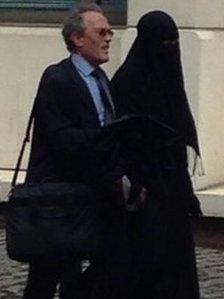Muslim woman must remove veil to give trial evidence
- Published

The defendant, who cannot be identified, was present for the hearing
A Muslim woman can stand trial wearing a full-face veil but must remove it to give evidence, a judge has ruled.
Judge Peter Murphy made the ruling at Blackfriars Crown Court in London where the woman is due to stand trial accused of intimidating a witness.
The 22-year-old woman, from Hackney, has refused to remove her niqab and reveal her face in front of any man.
The woman, who cannot be named for legal reasons, pleaded not guilty at an earlier hearing.
The judge's ruling means that if the woman, who started wearing a veil in May 2012, refuses to comply during her trial she could be jailed for contempt of court.
The only part of a niqab-wearer's face that is visible is a narrow section across the eyes.
The judge said he would offer the woman a screen to shield her from public view while giving evidence but that she had to be seen by him, the jury and lawyers.
At other times during the trial the woman will be allowed to keep her face covered while sitting in the dock.
'Elephant in courtroom'
In the ruling Judge Murphy said: "The ability of the jury to see the defendant for the purposes of evaluating her evidence is crucial."
Referring to the woman as "D", he said he had "no reason to doubt the sincerity of her belief" and his decision would have been the same if she had worn the niqab for years.
He said that "the niqab has become the elephant in the courtroom" and there was widespread anxiety among judges over how to tackle the issue.
He added he hoped "Parliament or a higher court will provide a definite answer to the issue soon".
Judge Murphy said: "If judges in different cases in different places took differing approaches [to the niqab] the result would be judicial anarchy."
The woman's defence barrister Susan Meek had argued the woman's human right to express her faith through her attire would be breached if she was ordered to remove her veil.
When asked if there would be an appeal against the decision, the woman's lawyer said she and her client would "consider our options".
At a previous hearing, the issue of her identity was resolved when the woman removed her veil in private for a female police officer.
Judge Murphy's ruling comes as Liberal Democrat Home Office minister Jeremy Browne said he was "uneasy" about restricting freedoms and called for a national debate on the state's role in stopping veils being imposed on girls.
Keith Porteous Wood, executive director of the National Secular Society, said he believed it was "vital" defendants' faces were visible at "all times" and said he "regretted" the judge's decision.
He added: "We will be complaining to the Office of Judicial Complaints and also be asking senior legal officers to make visibility throughout court hearings mandatory, and not subject to judges' discretion."
The woman's trial over alleged witness intimidation is due to begin at Blackfriars Crown Court on 4 November.
- Published16 September 2013
- Published16 September 2013
- Published16 September 2013
- Published16 September 2013
- Published16 September 2013
- Published16 September 2013
- Published12 September 2013